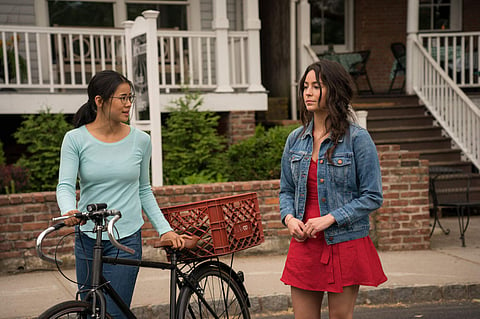The Half Of It Movie Review: A wholesome tale of emotional discovery
Rating:(3.5 / 5)
In Ritesh Batra’s The Lunch Box, Sajan Fernandes (played by the lovely Irrfan Khan) talks about a painter he crossed by on the pavement. He describes how the artist created multiple pieces of the same painting, and yet if you looked closely, you could discover that they are all different — a different face here, a different tree there. The scene is my favourite example of how similar and yet different our stories can be, of how stereotypes are born. As Khalid Hossineni observes in Kite Runner, cliches are usually dead on and it is why they are so popular. But that doesn’t mean we let them define us. Until our teens, we mostly live the stereotypes we inherit. The teenage years form the foundation of our personalities, our ideologies, for these are the years where we question our worlds, ourselves. For long, I have wondered why high school stories rarely explore the depth of emotional growth we face during those years. And I have finally found my answer in Netflix’s The Half Of It.
Director: Alice Wu
Cast: Leah Lewis, Daniel Diemer, Alexxis Lemire
Streaming on: Netflix
The best part of Alice Wu’s teen drama is that she refuses to let her characters be defined by their stereotypes. Ellie Chu (Leah Lewis) is a textbook high-school drama lead: intelligent, articulate, writes essays for others to make a quick buck, even plays a musical instrument. Aster Flores (Alexxis Lemire) is the popular good-looking girl, who dates the school heartthrob, and Paul Munsky (Daniel Diemer) is the handsome football player, the simple but sweet guy. But is that all they are? Ellie Chu observes at one point that she likes to hide behind other people’s words, for what does she know? She is a 17-year old who has lived all her life in a sleepy little town called Squahamish. I couldn’t help but make a connection to the statement with stereotypes. Isn’t that what we do, hide behind stereotypes? We pick our closest fit and hide behind it, scared to step out, of being lost. But how can we get discovered if we aren't lost?
To term Alice Wu’s creation a mere ‘queer story’, would be equivalent to those stereotypes we resort to for the sake of convenience. Rather, she weaves an empathetic tale of discovery through these three people, handing nuggets of emotional wisdom throughout in the subtlest ways possible. Circumstances push these to creak open the doors of the cliche closets, only to let a sliver of humanity inside, illuminating corners of their desire that they had never known before.
Wu achieves this, not only with her nuanced writing but also by juxtaposing thoughts and words of other famous writers and thinkers. There are references to Jean-Paul Sartre's famous play, No Exitz and also the quote ‘Hell is other people’. She also uses Oscar Wilde to point out the pretentiousness we have normalised under the name of romance, of ancient greek ideology that theorises our search for ‘our other half’, and of Plato’s name for this search, Love. As Wu ponders more of these constructs, she comes with her own little gems. Like when Ellie says, “Gravity is matter's response to loneliness.” Aster asks about the source of the quote and Ellie responds with an “I don’t know.” “Then, you said it.” It feels meta as the writing not only unravels the story but also acts as a commentary of sorts. The Half Of It feels like an embodiment of the ‘hour of secrets’, and the unknown getaway — sources of introspection, reflection, and acknowledgement.
And how can introspection, reflection, or discovery be separated from contradiction? The Half Of it also beautifully captures this emotional tussle, of the moral spaces we clear for ourselves. Paul says he doesn’t want to cheat on a test but isn’t wary of asking a stranger to help with a love letter and to pretend to be someone who he is not. Ellie is an atheist, but she acknowledges that it can feel lonely sometimes. For Aster, it is the irony behind her popularity. “I am like a lot of people,” she says, later adding, “We are all different in the same way”. The Half Of It encapsulates the co-existence of contradictory moments and emotions seamlessly blending into each other under the comforting blanket of conversation. (One can sense this with the visuals as well. The film uses a lot of dissolve in its edits, and it is also well-staged. Not to mention the lead cast turn in some fine performances.)
The more I think of it, the more the title feels like an acknowledgment of the stereotypes we take cover behind. Half of it, are the cliches we choose to embody, and the rest is the never-ending journey to be not defined by it. We begin to discover the language our souls speak during adolescence, ask questions that would become milestones in our identity. Alice Wu’s film represents that with the perfect balance of innocence and maturity it deserves. It is these bold strokes, that make The Half Of It, a great painting, and one that will stay with me for a long time.

